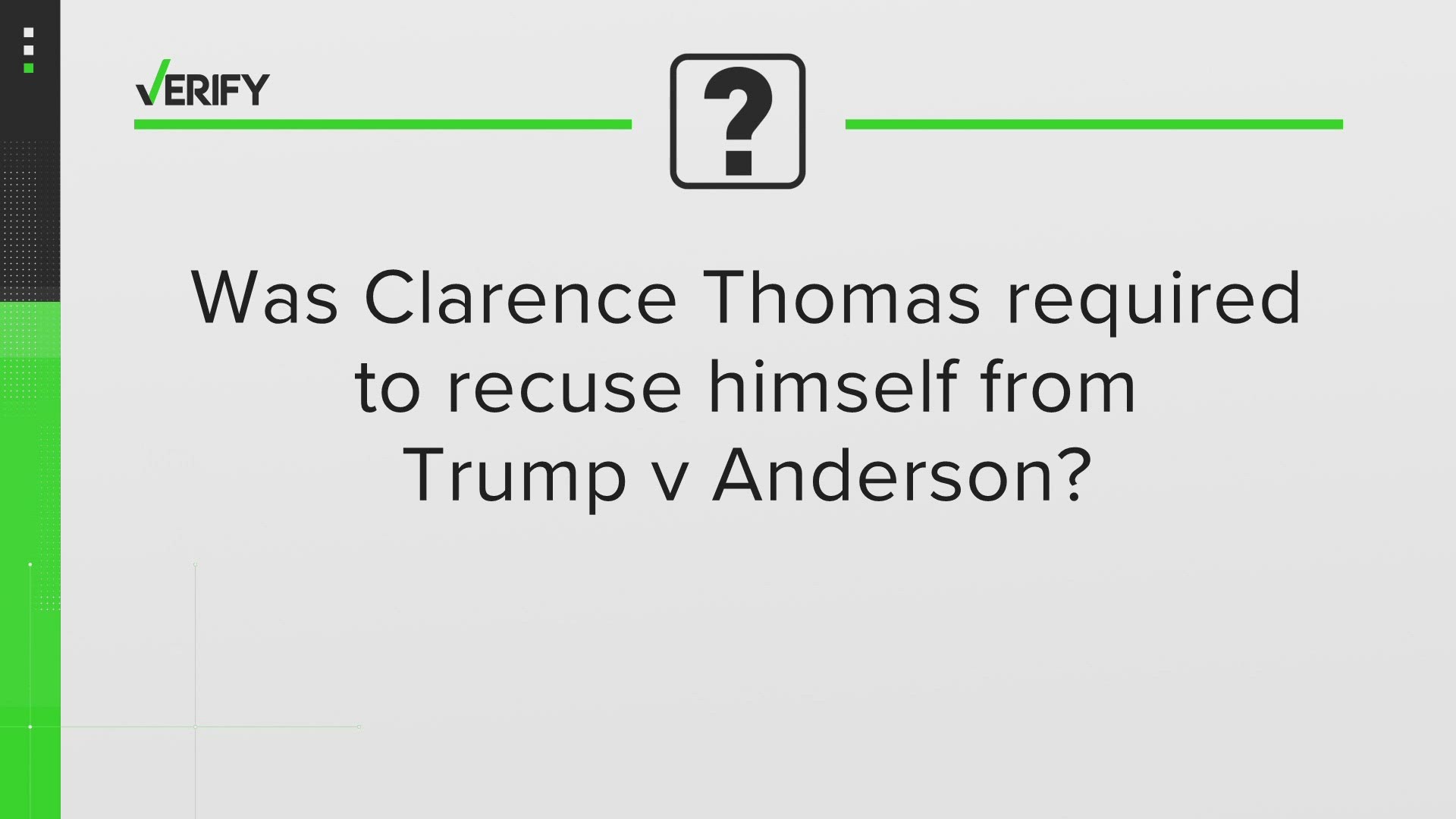WASHINGTON — The Supreme Court heard oral arguments Thursday morning in a case about whether former President Donald Trump belongs on the ballot or in the White House. But another trending conversation happening at the same time was about whether one of the Justices belonged on the bench this morning.
This case trended on social media all day. But alongside #SupremeCourt has been Clarence Thomas.
A few members of Congress joined the chorus who said Justice Thomas was wrong for not recusing himself from hearing the arguments in Trump v. Anderson because of a presumed conflict of interest regarding his wife.
QUESTION
Was Justice Clarence Thomas required by the Supreme Court's Code of Conduct for Justices to recuse himself from Trump v. Anderson?
SOURCES
Professor Paul Schiff Berman, George Washington University Law School
ANSWER
Justices have the discretion, not the requirement, to recuse themselves from a case to avoid the appearance of a conflict.
WHAT WE FOUND
The Supreme Court issued a Code of Conduct for Justices in November following a series of stories by ProPublica about Justice Thomas and his relationship with Harlan Crow, a billionaire who reportedly gifted him luxury vacations and more.
The standards are similar to those long in use by lower federal judges. They include guidelines reminding Justices to ignore outside influence when debating a case, how to manage extrajudicial activities, fundraising appearances, personal financial investments, and more.
On the subject of conflicts of interest, the code says, “A Justice should disqualify himself or herself in a proceeding in which the Justice’s impartiality might reasonably be questioned, that is, where an unbiased and reasonable person who is aware of all relevant circumstances would doubt that the Justice could fairly discharge his or her duties.”
"It's beyond just literal conflicts of interest," Paul Schiff Berman, Walter S. Cox Professor of Law at George Washington University Law School, said. "It also looks at anything that would harm the institutional legitimacy of the court by creating the appearance of impropriety."
The Code of Conduct for Justices goes on to list some circumstances that might meet the criteria, including if a Justice’s spouse has an interest that could be affected by the outcome of the case.
That is why critics called for Justice Thomas to recuse himself.
His wife, Virginia "Ginni" Thomas, has been implicated in the events leading up to the assault on the Capitol on January 6, 2021.
According to the Washington Post, the House select committee investigating the attack received emails between Thomas and Mark Meadows, Trump’s chief of staff, and John Eastman, the attorney at the center of the effort to overturn the results of the 2020 presidential election. She also reportedly pressured Arizona officials to send a fake slate of electors in support of former President Trump. That scheme led to the assault on the Capitol, and the lawsuit at the heart of Trump v. Anderson claims his actions before and on January 6, 2021, amounted to insurrection and should disqualify him from running for president again.
However, as a report from the Congressional Research Service explains, the Code of Conduct for Justices “contains no enforcement mechanism.”
"There's no requirement that any judge ever step away from a case," Berman added. "It's a question of whether the judge or Justice, looking at the ethics code, believes that there is a reason that they should recuse themselves."
The Code of Conduct for Justices also says, “The rule of necessity may override the rule of disqualification,” giving Justices more reason to take their seats.
"It would be problematic," Berman explained, "if Justice Thomas were hypothetically to recuse himself and then the court was deadlocked 4-4 on this crucial question of whether Trump was allowed on the ballot. I don't think they are going to be deadlocked 4-4, so, I think it's not really an issue. But, it's something that every Justice has to think about. When they recuse themselves--if we're talking about a lower court judge, that judge can be replaced by another judge on that circuit court or in that district. But, if a Supreme Court Justice recuses him or herself, then we're down to eight Justices or seven Justices or six Justices deciding a case, and that has consequences."
Given the former president's involvement in this case, some social media users made the argument that the three Justices he appointed should have recused themselves, as well as the Justices he has criticized or who oppose his views. "It can't be the case that Justices should recuse themselves any time, any case involving the administration of a president that appointed them comes up because that would just be too many cases," Berman stated.

